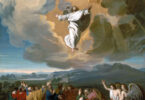
Michael Nguyen SVD
Historically speaking, Palestine in Jesus’ time was under the control of the Romans. Under the fierce attacks of General Pompey and his invincible armies, Jerusalem was eventually defeated in 63BCE. The land thus belonged to Caesar, though later Herod was appointed king by the Romans in 37BCE. Being governed by the Romans, the Jews during the first century longed and prayed for the arrival of the Messiah, a leader figure like King David, who would deliver the people from the iron grip of the Romans, and restore the Davidic kingdom, once covered a vast area in the Middle East. Messiah, the Hebrew word, or Christ, the Greek word, means the Anointed. King Saul and King David and other kings of the Israelites were formally anointed by God, usually through the prophets, before being recognized as the legitimate kings. Though various figures were also anointed in the Israelite history, culturally and historically speaking, the notion of Messiah or Christ would have connoted or carried royal implications in Palestine during the first century. Therefore, when John appeared in the desert, performed the baptism by the river Jordan, and preached the message of repentance, many people in Palestine streamed to the desert to listen to the prophet. Perhaps, John, in the eyes of the Jews, entered onto the stage as a prominent candidate for the Messianic throne that the people were eagerly awaiting. But, John the Baptist denied this position and pointed the attention to Jesus (John 1:19-21). Having seen Jesus coming to him for baptism, John declared: “Behold, the lamb of God” (John 1:29). However, even John, after affirming the Messianic role of Jesus in public, he himself carried in his mind some degree of uncertainty of Jesus’ Messianic mission; hence, he sent his disciples to ask Jesus in very straightforward words, “Are you the one who is to come, or are we to wait for another?” (Luke 7:19).
Having understood the overall political situation in Palestine during the first century, the reader might be able to appreciate more the details and the flow of today’s Gospel reading (Mark 8:27-35). According to the evangelist, in the region of Caesarea Philippi, 40 kilometers north of the Sea of Galilee, Jesus asked the disciples a question concerning how the Jews perceived his identity and mission. The name of first and prominent figure came up at once was John the Baptist, for by this time, John was beheaded in the prison (Mark 6:14-29). The disciples added two more famous characters in the Old Testament: Elijah and Jeremiah (Matt 16:14). Finally, Jesus directed the query to his disciples, “But you. Who do you say I am?”. On behalf of the disciples, the outspoken Peter quickly spoke up, “You are the Christ;” namely, you are the Anointed, or you are the King that we were longing, praying, and waiting for.
Perhaps, with this kind of expectation on Jesus, Peter left his fishing boat, fishing career, and his family to follow him. Perhaps, with this kind of mentality, James and John pleaded with Jesus for the two significant seats when Jesus is enthroned in his earthly kingdom (Mark 10:35-41). Perhaps, with this misconception of Jesus’ Messianic mission, Peter strongly objected to the very pessimistic future and miserable destination of the Christ, the kind of King that Jesus revealed to Peter and the other disciples right after Peter’s confession.
Views: 0







